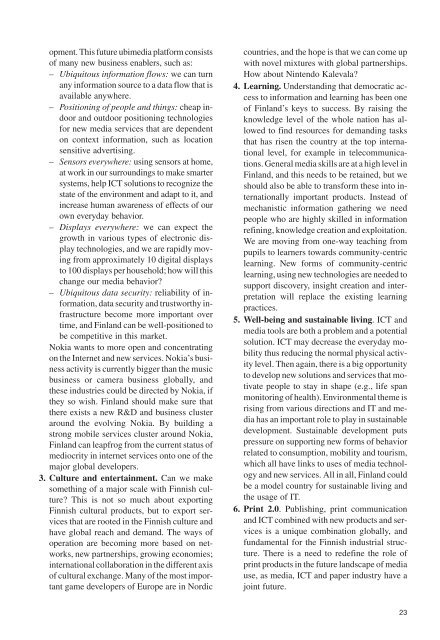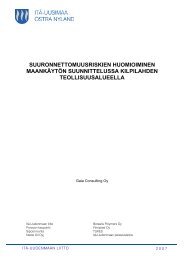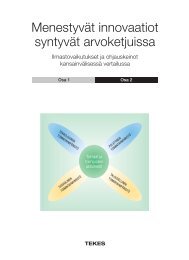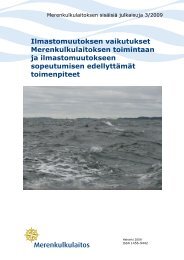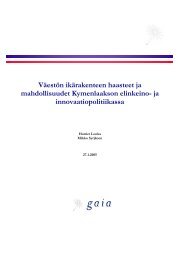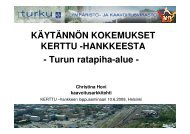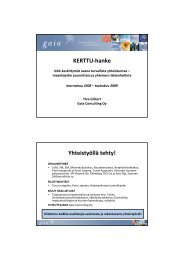227/08 Social challanges s the basis for foresight - Gaia
227/08 Social challanges s the basis for foresight - Gaia
227/08 Social challanges s the basis for foresight - Gaia
Create successful ePaper yourself
Turn your PDF publications into a flip-book with our unique Google optimized e-Paper software.
opment. This future ubimedia plat<strong>for</strong>m consists<br />
of many new business enablers, such as:<br />
– Ubiquitous in<strong>for</strong>mation flows: we can turn<br />
any in<strong>for</strong>mation source to a data flow that is<br />
available anywhere.<br />
– Positioning of people and things: cheap indoor<br />
and outdoor positioning technologies<br />
<strong>for</strong> new media services that are dependent<br />
on context in<strong>for</strong>mation, such as location<br />
sensitive advertising.<br />
– Sensors everywhere: using sensors at home,<br />
at work in our surroundings to make smarter<br />
systems, help ICT solutions to recognize <strong>the</strong><br />
state of <strong>the</strong> environment and adapt to it, and<br />
increase human awareness of effects of our<br />
own everyday behavior.<br />
– Displays everywhere: we can expect <strong>the</strong><br />
growth in various types of electronic display<br />
technologies, and we are rapidly moving<br />
from approximately 10 digital displays<br />
to 100 displays per household; how will this<br />
change our media behavior?<br />
– Ubiquitous data security: reliability of in<strong>for</strong>mation,<br />
data security and trustworthy infrastructure<br />
become more important over<br />
time, and Finland can be well-positioned to<br />
be competitive in this market.<br />
Nokia wants to more open and concentrating<br />
on <strong>the</strong> Internet and new services. Nokia’s business<br />
activity is currently bigger than <strong>the</strong> music<br />
business or camera business globally, and<br />
<strong>the</strong>se industries could be directed by Nokia, if<br />
<strong>the</strong>y so wish. Finland should make sure that<br />
<strong>the</strong>re exists a new R&D and business cluster<br />
around <strong>the</strong> evolving Nokia. By building a<br />
strong mobile services cluster around Nokia,<br />
Finland can leapfrog from <strong>the</strong> current status of<br />
mediocrity in internet services onto one of <strong>the</strong><br />
major global developers.<br />
3. Culture and entertainment. Can we make<br />
something of a major scale with Finnish culture?<br />
This is not so much about exporting<br />
Finnish cultural products, but to export services<br />
that are rooted in <strong>the</strong> Finnish culture and<br />
have global reach and demand. The ways of<br />
operation are becoming more based on networks,<br />
new partnerships, growing economies;<br />
international collaboration in <strong>the</strong> different axis<br />
of cultural exchange. Many of <strong>the</strong> most important<br />
game developers of Europe are in Nordic<br />
countries, and <strong>the</strong> hope is that we can come up<br />
with novel mixtures with global partnerships.<br />
How about Nintendo Kalevala?<br />
4. Learning. Understanding that democratic access<br />
to in<strong>for</strong>mation and learning has been one<br />
of Finland’s keys to success. By raising <strong>the</strong><br />
knowledge level of <strong>the</strong> whole nation has allowed<br />
to find resources <strong>for</strong> demanding tasks<br />
that has risen <strong>the</strong> country at <strong>the</strong> top international<br />
level, <strong>for</strong> example in telecommunications.<br />
General media skills are at a high level in<br />
Finland, and this needs to be retained, but we<br />
should also be able to trans<strong>for</strong>m <strong>the</strong>se into internationally<br />
important products. Instead of<br />
mechanistic in<strong>for</strong>mation ga<strong>the</strong>ring we need<br />
people who are highly skilled in in<strong>for</strong>mation<br />
refining, knowledge creation and exploitation.<br />
We are moving from one-way teaching from<br />
pupils to learners towards community-centric<br />
learning. New <strong>for</strong>ms of community-centric<br />
learning, using new technologies are needed to<br />
support discovery, insight creation and interpretation<br />
will replace <strong>the</strong> existing learning<br />
practices.<br />
5. Well-being and sustainable living. ICT and<br />
media tools are both a problem and a potential<br />
solution. ICT may decrease <strong>the</strong> everyday mobility<br />
thus reducing <strong>the</strong> normal physical activity<br />
level. Then again, <strong>the</strong>re is a big opportunity<br />
to develop new solutions and services that motivate<br />
people to stay in shape (e.g., life span<br />
monitoring of health). Environmental <strong>the</strong>me is<br />
rising from various directions and IT and media<br />
has an important role to play in sustainable<br />
development. Sustainable development puts<br />
pressure on supporting new <strong>for</strong>ms of behavior<br />
related to consumption, mobility and tourism,<br />
which all have links to uses of media technology<br />
and new services. All in all, Finland could<br />
be a model country <strong>for</strong> sustainable living and<br />
<strong>the</strong> usage of IT.<br />
6. Print 2.0. Publishing, print communication<br />
and ICT combined with new products and services<br />
is a unique combination globally, and<br />
fundamental <strong>for</strong> <strong>the</strong> Finnish industrial structure.<br />
There is a need to redefine <strong>the</strong> role of<br />
print products in <strong>the</strong> future landscape of media<br />
use, as media, ICT and paper industry have a<br />
joint future.<br />
23


